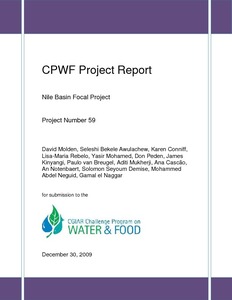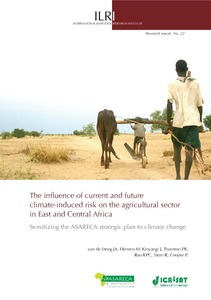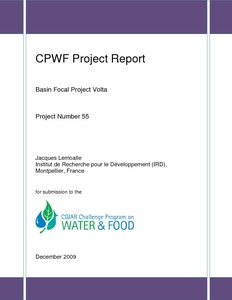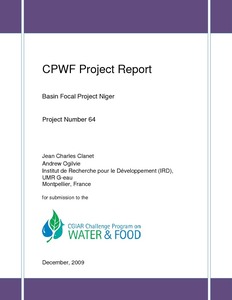CGIAR is the only worldwide partnership addressing agricultural research for development, whose work contributes to the global effort to tackle poverty, hunger and major nutrition imbalances, and environmental degradation.
It is carried out by 15 Centers, that are members of the CGIAR Consortium, in close collaboration with hundreds of partners, including national and regional research institutes, civil society organizations, academia, development organizations and the private sector.
The 15 Research Centers generate and disseminate knowledge, technologies, and policies for agricultural development through the CGIAR Research Programs. The CGIAR Fund provides reliable and predictable multi-year funding to enable research planning over the long term, resource allocation based on agreed priorities, and the timely and predictable disbursement of funds. The multi-donor trust fund finances research carried out by the Centers through the CGIAR Research Programs.
We have almost 10,000 scientists and staff in 96 countries, unparalleled research infrastructure and dynamic networks across the globe. Our collections of genetic resources are the most comprehensive in the world.
What we do
We collaborate with research and development partners to solve development problems. To fulfill our mission we:
- Identify significant global development problems that science can help solve
- Collect and organize knowledge related to these development problems
- Develop research programs to fill the knowledge gaps to solve these development problems
- Catalyze and lead putting research into practice, and policies and institutions into place, to solve these development problems
- Lead monitoring and evaluation, share the lessons we learn and best practices we discover;
- Conserve, evaluate and share genetic diversity
- Strengthen skills and knowledge in agricultural research for development around the world
Making a difference
We act in the interests of the world’s poorest and most vulnerable. Our track record spans four decades of research.
Our research accounted for US$673 million or just over 10 percent of the US$5.1 billion spent on agricultural research for development in 2010. The economic benefits run to billions of dollars. In Asia, the overall benefits of CGIAR research are estimated at US$10.8 billion a year for rice, US$2.5 billion for wheat and US$0.8 billion for maize.
It has often been cited that one dollar invested in CGIAR research results in about nine dollars in increased productivity in developing countries.
Sweeping reforms for the 21st century
Political, financial, technological and environmental changes reverberating around the globe mean that there are many opportunities to rejuvenate the shaky global food system. Developments in agricultural and environmental science, progress in government policies, and advances in our understanding of gender dynamics and nutrition open new avenues for producing more food and for making entrenched hunger and poverty history.
The sweeping reforms that brought in the CGIAR Consortium in 2010 mean we are primed to take advantage of these opportunities. We are eagerly tackling the ever more complex challenges in agricultural development. We are convinced that the science we do can make even more of a difference. To fulfill our goals we aim to secure US$1 billion in annual investments to fund the current CGIAR Research Programs.
CGIAR has embraced a new approach that brings together its strengths around the world and spurs new thinking about agricultural research for development, including innovative ways to pursue scientific work and the funding it requires. CGIAR is bringing donors together for better results and enabling scientists to focus more on the research through which they develop and deliver big ideas for big impact. As a result, CGIAR is more efficient and effective, and better positioned than ever before to meet the development challenges of the 21st century.
We are no longer the ‘Consultative Group on International Agricultural Research’. In 2008 we underwent a major transformation, to reflect this and yet retain our roots we are now known simply as CGIAR.
Members:
Resources
Displaying 9461 - 9465 of 12598Nile Basin Focal Project. Synthesis report
The Nile basin experiences wide spread poverty, lack of food and land and water
degradation. Because poverty is linked to access to water for crop, fish and
livestock based livelihoods, improving access to water and increasing agricultural
water productivity can potentially contribute substantially to poverty reduction.
The major goal of the Nile Basin Focal project is to identify high potential
investments that reduce poverty yet reverse trends in land and water
degradation. This is done through the implementation of six interlinked work
The influence of current and future climate-induced risk on the agricultural sector in East and Central Africa: Sensitizing the ASARECA strategic plan to climate change
Rainfed agriculture is and will remain the dominant source of staple food production for the majority of the rural poor in Eastern and Central Africa (ECA). It is clear that larger investments in agriculture by a broad range of stakeholders will be required if this sector is to meet the food
Improved planning of large dam operation: Using decision support systems to optimize livelihood benefits, safeguard health and protect the environment
Improved Planning of Large Dam Operation: Using Decision Support Systems to Optimize
Livelihood Benefits, Safeguard Health and Protect the Environment. This project was undertaken
with the aim of providing information to assist policy-makers, water resource managers and other
interested stakeholders in the planning and management of large dams in Africa. The project
highlighted the importance of considering environmental and social (including health) issues in
dam planning and operation and illustrated how contemporary Decision Support Systems can be
Basin Focal Project Volta
The Basin Focal Project Volta (BFP Volta) was developed along three main steps:
Assessment of present conditions of the distribution of rural poverty, of farming
systems with their productivity and water productivity;
Analysis of opportunities and risks, especially under the double pressure of demography
and possible climate change, and modeling of water resources to identify sensitivity of
water allocation to development and climate scenarios; and
Identification of research gaps and implementation plan.
Basin Focal Project Niger
Challenge Program Water and Food: Basin Focal Project NIGER
Faced with increasing food and water insecurity as a result of climatic and
anthropogenic (demography, land use) changes, the CGIAR Challenge Program
for Water and Food commissioned research in 10 river basins to study the links
between water, food and poverty. Looking at the Niger river basin, we carry out
a diagnosis of the hydrologic and agronomic potential, before attempting to
identify how good agricultural water management may reduce vulnerability in the






